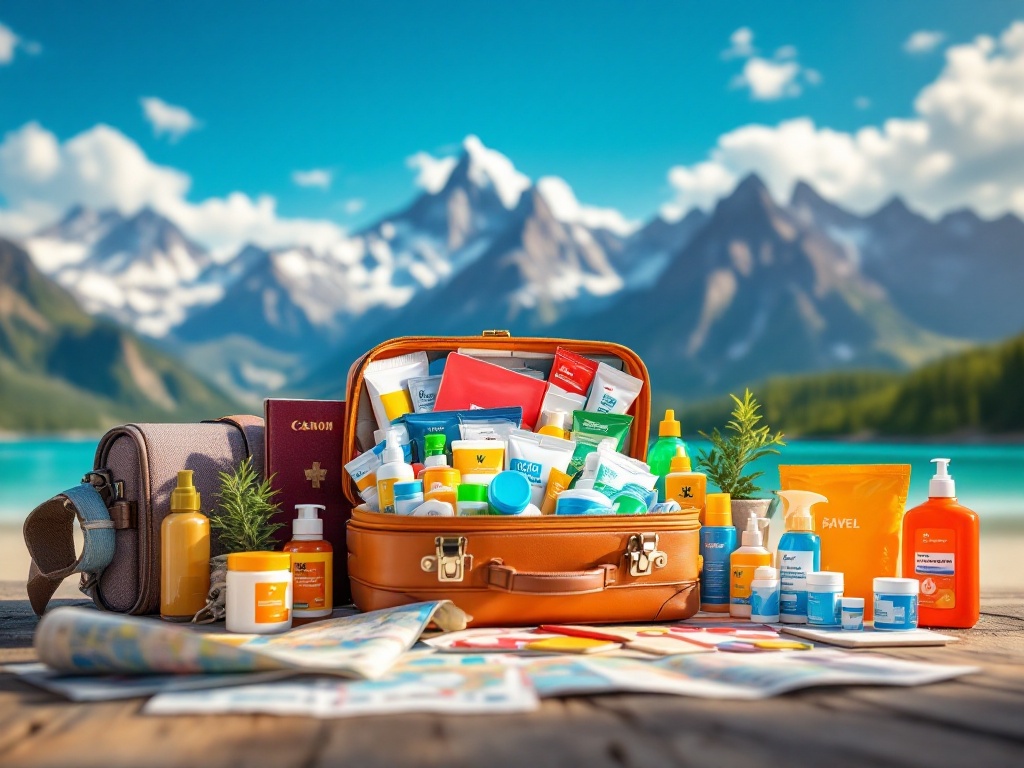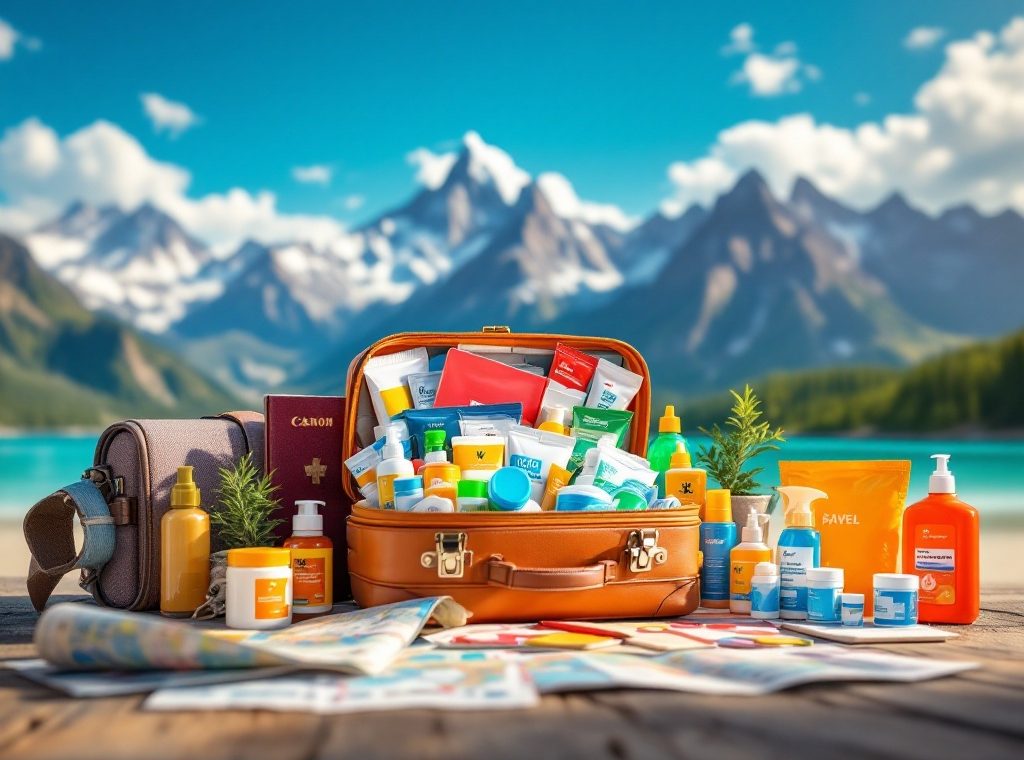Travel Health Kits: What You Should Pack
Planning a trip? Don’t let unexpected health issues ruin your adventure! A well-stocked travel health kit is your key to a safe and worry-free journey. Learn how to pack essential medications, first-aid supplies, and protective items like sunscreen and insect repellent. Discover expert tips on organizing your kit, ensuring medication safety, and complying with international travel regulations. Prepare for anything, from minor cuts to altitude sickness, and enjoy peace of mind on your next getaway. Read on to build your ultimate travel health kit.
Important information

- Pack a first-aid kit with bandages, antiseptic wipes, gauze, medical tape, and a thermometer.
- Bring essential medications: pain relievers (acetaminophen/ibuprofen), antidiarrheals, and any personal prescriptions.
- Include hygiene and preventative items: sunscreen (SPF 15+), insect repellent (10-30% DEET), hand sanitizer, and water purification tablets.
- Organize your kit in a waterproof, accessible container, labeling items clearly. Check expiration dates regularly.
- Research your destination’s health risks and local regulations for carrying medications across borders. Carry copies of prescriptions and a doctor’s note if needed.
Preparing Your Travel Health Kit: Tips and Recommendations
A well-prepared travel health kit is essential for peace of mind on any trip. Pack items you might need but may be difficult to find at your destination, allowing you to effectively manage unexpected health concerns and roadside emergencies. Before you go, research potential health risks, local healthcare access, and environmental factors specific to your destination.
Organize your kit in a waterproof, easily accessible container.
Clearly label and arrange items for quick retrieval.
Regularly check expiration dates, replacing or restocking as needed.
Tailor your kit to your destination. For tropical climates, pack antimalarials and treatments for waterborne illnesses. If traveling to high altitudes, include altitude sickness medication for your safety.
Store medications properly, following specific storage instructions and keeping them in their original labeled containers for easy identification.
Carry copies of your prescriptions and a doctor’s letter explaining your medical conditions and medications, especially crucial for controlled substances. Be sure to understand and comply with all regulations for carrying medications across international borders to avoid any complications.
How to Pack and Organize
Keep your travel health kit contents dry and accessible with a waterproof bag. Pack essential medications and first-aid supplies for quick access.
Ensuring Medication Safety and Compliance
Traveling with medications requires careful planning. Always pack your medications and medical supplies in your carry-on luggage. Keep them in their original containers. If necessary, carry a doctor’s note explaining your medical needs and prescriptions. Adhere to the TSA’s 3-1-1 rule for liquids. Before your trip, verify the legality of your medications at your destination. Make copies of your prescriptions and insurance card and keep them with you.
Key Components of a Travel Health Kit
Pack a comprehensive first-aid kit for your trip. Include essentials such as bandages, antiseptic wipes, gauze, and medical tape for minor cuts and scrapes. Don’t forget pain relievers, antidiarrheals, and any personal prescriptions. For maintaining hygiene and preventing illness, pack sunscreen, insect repellent, and hand sanitizer.
First-aid Supplies to Consider
A well-stocked first-aid kit is essential for handling minor injuries. Be sure to include:
- various sizes of bandages,
- antiseptic and antibacterial wipes,
- sterile gauze pads,
- medical tape,
- a digital thermometer,
- scissors.
Having these supplies readily available ensures you’re prepared for life’s little mishaps.
Essential Medicines for Your Kit
When packing for your trip, remember essential medications, such as pain relievers, fever reducers, and antihistamines for common ailments. Also, pack any prescribed antibiotics and personal prescriptions to ensure you have enough medication for the duration of your trip.
Protective Items for Safe Travel
- Pack insect repellent to ward off disease-carrying insects.
- Bring sunscreen to shield your skin from the sun’s harmful rays.
- Include water purification tablets to prevent illness from contaminated water sources.
These essentials will contribute to a safe and healthy trip.
Medicines to Include in Your Travel Health Kit
For pain and fever, pack acetaminophen (Tylenol) or ibuprofen (Advil, Motrin), readily available over-the-counter. Don’t forget a thermometer for accurate temperature monitoring.
A doctor-prescribed broad-spectrum antibiotic can be invaluable for combating bacterial infections while traveling. Consult your doctor for more information.
Over-the-counter antihistamines like diphenhydramine (Benadryl) or cetirizine (Zyrtec) can provide allergy relief. As always, consult your doctor before starting any new medication.
To combat motion sickness, consider packing meclizine (Dramamine) or dimenhydrinate (Gravol). For digestive troubles, loperamide can alleviate diarrhea, while antacids can soothe heartburn. These are typically available without a prescription.
Pain and Fever Medications
For pain and fever relief, pack acetaminophen (Tylenol) or ibuprofen (Advil, Motrin). These readily available medications can be invaluable when dealing with common travel ailments.
Antibiotics and Antihistamines
When packing for your trip, include antibiotics only if prescribed by your doctor, particularly for traveler’s diarrhea. Also, bring antihistamines to manage any allergy symptoms.
Anti-nausea and Digestive Aids
Pack anti-nausea medication and antacids to combat motion sickness and upset stomachs while traveling. These remedies can alleviate common digestive issues, such as nausea and heartburn.
Travel Health Kit Supplies for Emergencies
Safe travels start with clean hydration. Pack water purification tablets or a portable filter, especially when venturing into areas with questionable water quality. Hand sanitizer and antibacterial wipes are also essential for maintaining hygiene when soap and water are unavailable. A thermometer can quickly detect a fever, while a first-aid manual provides guidance for treating common injuries.
- Pack water purification tablets or portable filter for clean hydration, especially in areas with questionable water quality.
- Carry hand sanitizer and antibacterial wipes to maintain hygiene when soap and water aren’t accessible.
- Bring a thermometer for quick fever detection and a first-aid manual for treating common injuries.
Water Purification and Hygiene Products
Water purification tablets are essential for safe drinking water, especially when clean sources are scarce, keeping you hydrated on your adventures. Antibacterial hand wipes are equally important for maintaining hygiene and preventing the spread of germs when handwashing isn’t feasible. Pack both of these lightweight essentials. They could be lifesavers.
Temperature and Health Monitoring Tools
A digital thermometer is essential for quickly checking your body temperature and revealing a fever, which often signals illness. This makes it a vital tool for managing your health.
Outdoor and Sun Protection Essentials
Sunscreen is crucial for protecting your skin from sunburn, premature aging, and even skin cancer.
Insect repellent is equally important, shielding you from insect-borne diseases like malaria, Zika, and Lyme disease.
For safe and healthy travels, pack both to safeguard yourself from the sun’s harmful rays and pesky insects.
Sunscreen and Insect Repellent
When preparing for your trip, remember to pack sunscreen with an SPF of 15 or higher for optimal sun protection. Don’t forget insect repellent, especially for children, opting for one containing 10% to 30% DEET to effectively ward off bites.

















